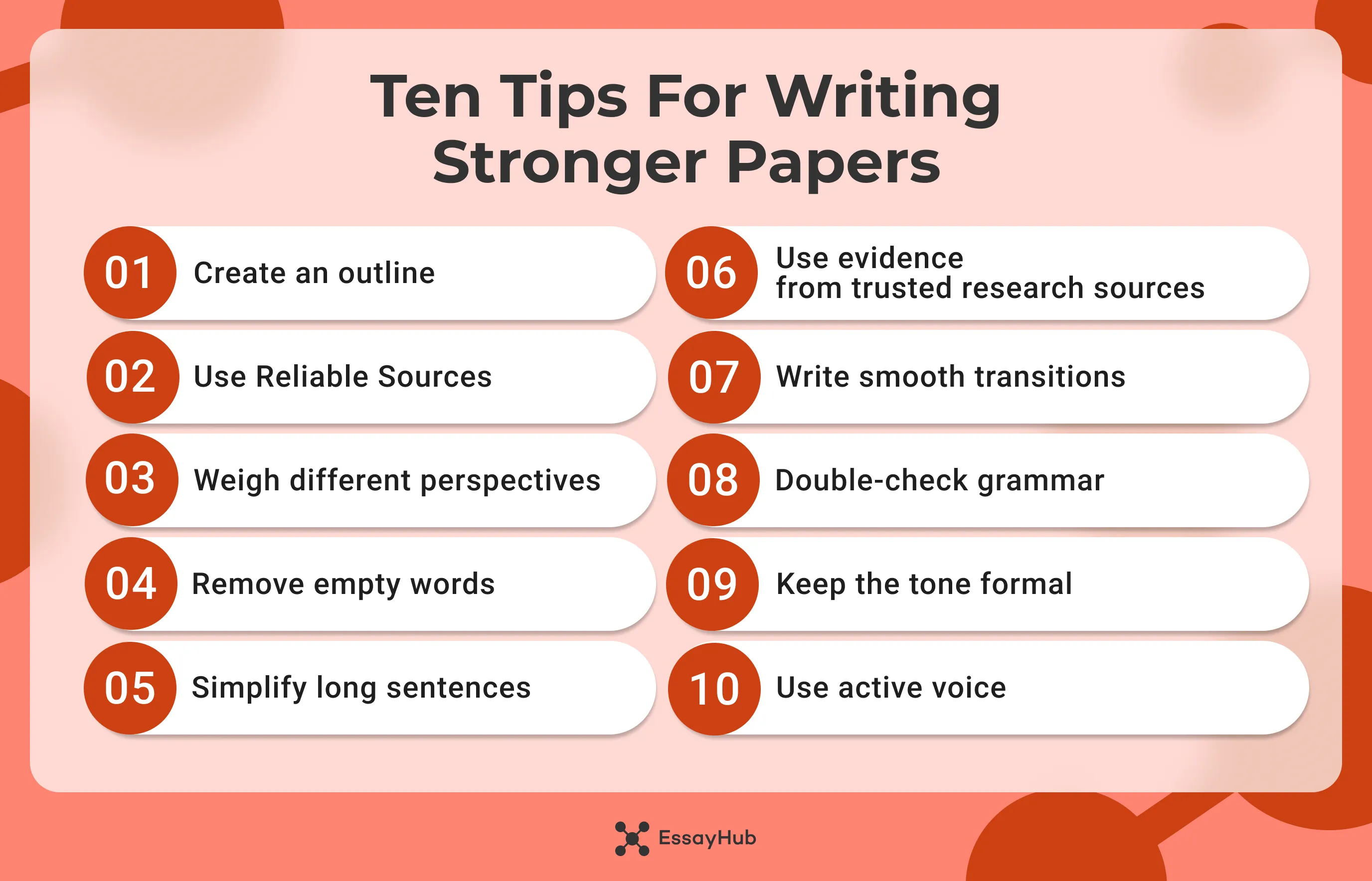There's a moment almost every student dreads: trying a sentence, then deleting it. Then, trying again, and somehow, it still reads flat. Academic essays have that kind of effect: they demand clarity and polish, yet also originality. That combination can get too heavy to handle from time to time.
This article gives you tips for academic writing that are written with the real struggles of students in mind. If you’re a student writing a research paper, and you feel that deadlines are already closer than comfortable, EssayHub can help you whenever 'write my essay' creeps up in your search engine history.
Academic Writing Style Explained
Academic style is just a way of shaping your thoughts so they carry weight in an academic space. And no, it isn't defined by complex ideas or big words. Good writing means organized thinking and arguments that are supported by evidence.
Here's what defines it:
- Language that's sharp and precise, never weighed down by filler or slang.
- A structure that guides the reader from one idea to the next without confusion.
- Arguments that lean on evidence and are backed up with sources.
- An objective tone that keeps the focus on the subject instead of personal opinion.
- Consistency in citing sources and formatting
If you ever feel stuck or need guidance, an academic ghostwriter on EssayHub can help you structure your ideas clearly and ensure your work meets academic standards.
10 Tips on How to Improve Your Academic Writing
The academic writing tips for students we'll discuss below are actual tools you can lean on when the words don't come that easily. If you've ever wondered how to write an academic essay that the reader takes seriously, the steps below offer a path that feels doable.
Here's the outline we'll follow:

Create an Outline
One of the most reliable answers to how to improve academic writing is simple: don't dive in blind. A paper without a proper structure can drift off quickly, and the main points get buried before they're properly discussed. That's why you need an outline for any academic paper: they are a skeleton around which you can later build your writing.
A basic plan might look like this:
- Introduction – set the stage and give your thesis statement;
- Body Paragraph 1 – one argument plus evidence;
- Body Paragraph 2 – next argument, more proof;
- Body Paragraph 3 – counterpoint or extra depth;
- Conclusion – tie the major points together without repeating word for word.
Each body section should include at least one clear supporting paragraph sentence that reinforces the thesis and ties back to your outline. Take a look at a research paper outline, the most important components are somewhat similar to other types of academic papers.
Use Reliable Sources for Academic Papers
Papers that lean only on your personal take mostly don't land as they should. To improve academic writing style, you want proof: voices outside your own that back up the claims you're making. A short, sharp quote can land an idea. A paraphrase shows you understood and reshaped it. Citations keep you honest and protect you from plagiarism. In any case, your literature review must be done thoroughly.
Example:
- Direct: "The unexamined life is not worth living" (Plato, 399 BCE).
- Paraphrased: Plato argued that reflection is essential to a meaningful life.
Let in Different Perspectives
Good writers don't lock themselves inside one perspective. Bringing in multiple angles shows balance and makes your reasoning harder to dismiss. Unless you're writing a personal narrative or a persuasive piece built on emotion, aim for neutrality. Take a paper on social media, for example. If you argue it harms attention spans, you'll gain more ground by also noting relevant research that highlights its role in community building.
Cut Out the Unnecessary Words
Jargon and redundancy drag essays down. Professors don't reward sentences stuffed with "utilize" when "use" will do. Long-winded fillers written just to meet the word count will do nothing but slow the pace.
Swap these out:
- "At this point in time" → "now"
- "In order to" → "to"
- "Due to the fact that" → "because"
Simplify Complex Ideas
Improve your academic writing by aiming for variety: short sentences to hit hard, longer ones when an idea needs space.
Overcomplicated:
Because the survey, which was distributed widely across multiple demographics and included several categories, produced a large amount of data, the researchers decided to narrow their analysis to one key trend.
Sharper:
The survey produced a large amount of data, so the researchers focused on one key trend.
See? Same meaning, less mess. And if simplifying complex information feels impossible, outside feedback (like what you'd find in assignment writing services can make all the difference.
Back Up Every Claim With Evidence
We've said this countless times: arguments without proof do nothing but take up space. The reader must know where your ideas come from. Strong academic writing means offering evidence reason for every claim, so your paper shows depth rather than assumptions. That's why concrete proof (facts, studies, well-chosen examples) needs to sit under every claim you make.
Here's what not to do:
"Everyone knows climate change is the biggest issue today."
This is not a sentence that belongs in academic research papers. Who is everyone? Where's the data?
Now compare:
"According to the IPCC's 2023 report, global surface temperatures have risen by 1.1°C since the late 19th century, making climate change one of the most urgent global concerns."
One sentence pulls numbers and authority into play. The other just floats. That's the difference evidence makes. And when you cite your sources, don’t forget to stick to the citation method that the professor probably requested (MLA, APA, or Chicago)!
Keep Paragraphs Connected
In order to improve your style in academic writing, you need sentences that stitch ideas together. Essays collapse when paragraphs are thrown in like random puzzle pieces. Transitions often work best by introducing reason sentences that connect one paragraph’s idea to the next without breaking the argument. This way, the reader doesn’t lose the logical flow.
Here's a quick cheat sheet:
Follow Grammar Rules
A sharp argument still crumbles if you pack it with spelling mistakes, for example. Every misplaced comma, every subject-verb mismatch chips away at credibility. Punctuation symbols are the last polish before handing your paper in.
Mistakes that trip students most often:
- It's vs. it's.
- Their vs. there.
- Verbs that don't match their subject (The data shows vs. The data show).
- Commas where they don't belong (or worse, missing where they should be).
- Colons and semicolons swapped around.
- Whole sentences left hanging without periods.
Keep the Formal Tone
Academic writing is not casual or conversational. Neither does it lean on filler language. To improve writing, you need to stay formal, and that means differentiating between the words that carry weight and ones that fill space. That's one of the most overlooked ways to improve academic writing skills for students.
Here are things to cut out:
- Words that don't belong: stuff, things, kids, anyways;
- Abbreviations: BTW, LOL, ASAP, etc.;
- Phrases: "you know," "a lot of," "kind of," "pretty much".
Use Active Voice for Stronger Sentences
Active voice carries more punch. It makes sentences clearer and easier to read. And that's the kind of writing professors remember. It shows who's doing the action instead of hiding it. Too much passive voice leaves writing weak and vague.
Look at the difference:
- Passive: The results were analyzed by the team.
- Active: The team analyzed the results.
Or this one:
- Passive: The decision was made to close the library early.
- Active: The director decided to close the library early.
Colloquial vs. Academic: Language for Research Papers
The easiest way to see the difference between casual and formal writing is to put them side by side.
Here's how the same idea shifts depending on the style:
One feels like a conversation with a friend. The other fits into a research paper.
Wrapping It Up
Better academic research papers happen by stacking small habits on top of each other. If you're wondering how to get better at academic writing, here are a few golden rules: an outline gives your ideas shape. Solid evidence from reliable sources during the preliminary research phase proves your arguments make sense. And a well-placed, smooth transition? That might be just what you need to make your writing process even more effective.
Some nights the words don't fall into place, and that's where outside help matters. Plenty of services can write essays for money, but what makes EssayHub stand out is the personalized guidance during academic paper reviewing or writing.
FAQ
What Does Good Academic Writing Look Like?
Good academic writing carries a certain rhythm. Sentences vary, but all of them serve the point. The tone feels professional without being stiff. Evidence is present but never dumped carelessly; it's integrated so the argument reads smoothly. Paragraphs connect, leading the reader forward without pause. At the end, the paper leaves the reader certain that the writer understood their subject.
What Makes an Academic Paper Good?
A good academic research paper feels deliberate. Every section sits where it belongs, and each idea grows naturally out of the one before it. The arguments have evidence under them. The voice stays steady and formal. Specific details, such as every citation method lined up, lack of grammatical errors, and consistent formatting, show you paid attention. And underneath all of that, there's critical thinking: the willingness to see the topic from more than one angle.
How to Write an Excellent Academic Paper?
The process of writing academic paper starts long before the first line is written. The research question needs to be sharp enough to guide your focus, yet open enough to allow exploration. A strong thesis statement anchors everything: you know where you're heading, and so does your reader. An outline comes next. As you draft, pull in strong sources, and keep each point tied back to the central idea.
- Essay and dissertation writing skills | University of Oxford. (n.d.). https://www.ox.ac.uk/students/academic/guidance/skills/essay
- Types of academic writing. (n.d.). The University of Sydney. https://www.sydney.edu.au/students/writing/types-of-academic-writing.html
- Research guides: Organizing Academic Research Papers: Academic Writing Style. (n.d.). https://library.sacredheart.edu/c.php?g=29803&p=185910



.png)
.png)

